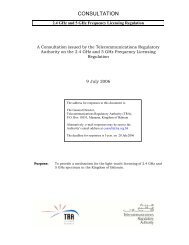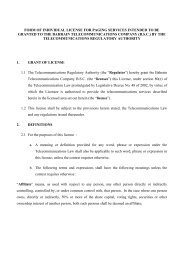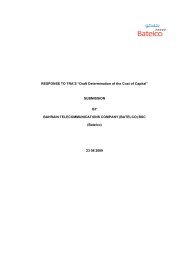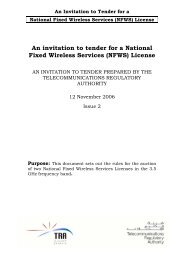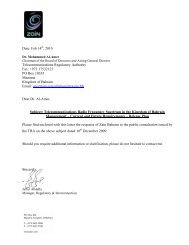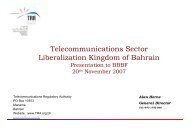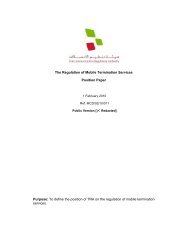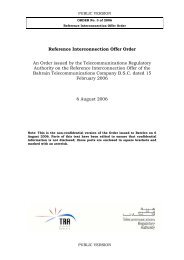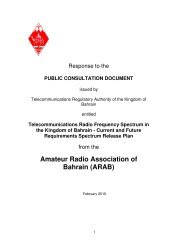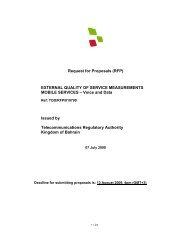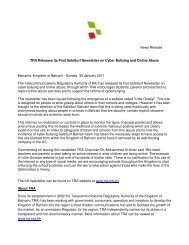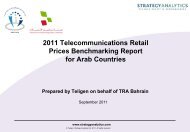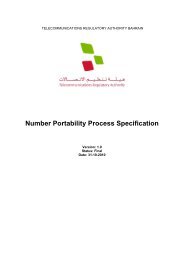Annual Report 2008 - TRA - Telecommunication Regulatory Authority
Annual Report 2008 - TRA - Telecommunication Regulatory Authority
Annual Report 2008 - TRA - Telecommunication Regulatory Authority
Create successful ePaper yourself
Turn your PDF publications into a flip-book with our unique Google optimized e-Paper software.
22 <strong>TRA</strong> <strong>Annual</strong> <strong>Report</strong> <strong>2008</strong> Building a Competitive Market<br />
The call termination rates - the fee Batelco charges to other operators for delivering calls from their networks to<br />
Batelco customers - were reduced by 5 per cent over fixed networks and 14 per cent over mobile networks.<br />
Before the new Offer came into effect, <strong>TRA</strong> invited all licensed operators to a meeting in order to discuss the Offer<br />
and its newly approved charges.<br />
Dominance in mobile termination services<br />
A significant part of the final cost a customer pays for a call derives from the wholesale tariff that one operator<br />
charges another for delivering the call to a customer on its network - the termination service. On mobile networks<br />
this covers voice calls, Short Messaging Services (SMS) and Multimedia Messaging Services (MMS). On 26 November<br />
<strong>TRA</strong> issued a draft regulation declaring both Batelco and Zain dominant in the mobile termination market. The<br />
effect of this is that both Zain and Batelco’s termination rates would be regulated.<br />
While Batelco’s termination rates had been regulated since 2003 and have decreased, Zain’s have not been regulated<br />
and are subject only to commercial agreements. With the expected entry into the market of a third operator and<br />
Zain gaining considerable market share, <strong>TRA</strong> considered that the two established operators should now be treated<br />
similarly. The move would provide added certainty for existing licensed operators as well as for the third mobile<br />
operator. The consultation was ongoing at the end of the year.<br />
<strong>Telecommunication</strong>s infrastructure<br />
One of the key requirements for fair and sustainable competition in the telecommunications market is effective<br />
access to public and private properties in order to deploy telecommunications infrastructure. Since the liberalisation<br />
of fixed line services in 2004, new market entrants had faced obstacles in installing alternative cable networks on<br />
the ground.<br />
New properties<br />
In January <strong>TRA</strong> began a project to identify and develop an appropriate regulatory policy for deploying networks<br />
in new property developments. These could be buildings, compounds or industrial parks – for example in the<br />
Islands. <strong>TRA</strong>’s objectives were to analyse the problems that operators had encountered and to look for models for<br />
delivering state-of-the-art telecommunications infrastructure and services to the people who live and work in these<br />
developments while at the same time safeguarding consumer choice.<br />
More than 60 people, comprising property developers, investors and telecommunications operators, attended a<br />
meeting held by <strong>TRA</strong> on this issue in June. The purpose was to present views on the appropriate and effective<br />
regulatory approach that would achieve <strong>TRA</strong>’s aims and facilitate investment.<br />
<strong>TRA</strong> hosts a meeting on telecommunications infrastructure in new properties developments



